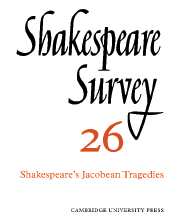Book contents
- Frontmatter
- Studies in Shakespearian and Other Jacobean Tragedy, 1918–1972: A Retrospect
- ‘Form and Cause Conjoin’d’: ‘Hamlet’ and Shakespeare’s Workshop
- The Art of Cruelty: Hamlet and Vindice
- From Tragedy to Tragi-Comedy: ‘King Lear’ as Prologue
- Jacobean Tragedy and the Mannerist Style
- ‘King Lear’ and Doomsday
- Macbeth on Horseback
- Shakespeare’s Misanthrope
- ‘Antony and Cleopatra’ and ‘Coriolanus’, Shakespeare’s Heroic Tragedies: A Jacobean Adjustment
- Shakespeare’s Venus and Adonis Sonnets
- Orlando: Athlete of Virtue
- The Unfolding of ‘Measure for Measure’
- Shakespeare and the Eye
- No Rome of Safety: The Royal Shakespeare Season 1972 Reviewed
- The Year's Contributions to Shakespearian Study 1 Critical Studies
- 2 Shakespeare’s Life, Times, and Stage
- 3 Textual Studies
- Index
- Plate section
Shakespeare’s Misanthrope
Published online by Cambridge University Press: 28 March 2007
- Frontmatter
- Studies in Shakespearian and Other Jacobean Tragedy, 1918–1972: A Retrospect
- ‘Form and Cause Conjoin’d’: ‘Hamlet’ and Shakespeare’s Workshop
- The Art of Cruelty: Hamlet and Vindice
- From Tragedy to Tragi-Comedy: ‘King Lear’ as Prologue
- Jacobean Tragedy and the Mannerist Style
- ‘King Lear’ and Doomsday
- Macbeth on Horseback
- Shakespeare’s Misanthrope
- ‘Antony and Cleopatra’ and ‘Coriolanus’, Shakespeare’s Heroic Tragedies: A Jacobean Adjustment
- Shakespeare’s Venus and Adonis Sonnets
- Orlando: Athlete of Virtue
- The Unfolding of ‘Measure for Measure’
- Shakespeare and the Eye
- No Rome of Safety: The Royal Shakespeare Season 1972 Reviewed
- The Year's Contributions to Shakespearian Study 1 Critical Studies
- 2 Shakespeare’s Life, Times, and Stage
- 3 Textual Studies
- Index
- Plate section
Summary
We do not need Herman Melville to warn us that Timon of Athens is an ambush for critics. Yet, in his nondescript edition of Shakespeare now at Harvard University, it is one of the plays most heavily marked. Marginal annotations are rare but pithy. Thus, when Timon urges the Bandits to plunder the shops of Athens, two of them are almost dissuaded from banditry. The third, an opportunist, tells his colleagues that it would be better to reform when less plunder is available: ‘There is no time so miserable but a man may be true’ (iv, iii, 459–60). This has been didactically paraphrased by the anonymous editor: ‘There is no hour in a man’s life so wretched, but he always has it in his power to become true, i.e. honest.’ And Melville, in the margin, has glossed the comment, after crossing it out: ‘Peace, peace! Thou ass of a commentator!’ His own feelings come to the surface when Timon drives his false friends out of the banquet hall, and Melville comments with Yankee succinctness: ‘Served ’em right.’ In his other reading he would frequently return to his misanthropic touchstone. Where La Bruyère wrote skeptically about friendship, Melville commented: ‘True, Shakespeare goes further: None die but somebody spurns them into the grave.’ Melville’s misquotation is even more absolute than the words of Shakespeare’s Apemantus: “Who dies that bears not one spurn to the grave / Of their friends’ gift?” (i, ii, 136–7).
- Type
- Chapter
- Information
- Shakespeare Survey , pp. 89 - 94Publisher: Cambridge University PressPrint publication year: 1973

